Atlantic Monthly Contributors's Blog, page 352
September 8, 2015
Willkommen: Germany’s Policy on Migrants

Germany’s vice chancellor says the country can take in 500,000 asylum-seekers annually.
“I believe we could certainly deal with something in the order of a half a million for several years,” Sigmar Gabriel, the vice chancellor, told ZDF television. “I have no doubt about it—maybe even more.”
Gabriel’s remarks come as Europe is facing its most severe migrant crisis since World War II. His country is already taking in more migrants than any other in the 28-member European Union. This year alone, it is accepting 800,000—four times the number it took in 2014.
Most of the migrants are Syrians, fleeing the civil war in their country. That conflict has created more than 4 million refugees, the vast majority of them in camps in Lebanon, Jordan, and Turkey. Germany is the favored destination for many of these refugees.
Gabriel said that while Germany could take large numbers, other EU member states must do their part. Germany and France want an EU-wide quota system for the migrants, but that’s a plan some Central and Eastern European countries—Hungary, Czech Republic, Slovakia, and Romania—are opposed to. Denmark is also deterring migrants from coming to its borders.
The European Commission is expected to propose quotas this week. Here’s more from Reuters:
The European Commission will propose national quotas to relocate 160,000 asylum-seekers arriving in Greece, Hungary and Italy, with Germany taking in more than 40,000 and France nearly 31,000. Countries that do not want to take part would be able to make financial contributions to buy their way out of the obligation on a temporary basis.
The flow of migrants meanwhile continues. On Monday, 7,000 migrants arrived in Macedonia. Some 30,000 others are on Greece’s islands, including Lesbos, awaiting processing.









Congress Returns

Lawmakers return to Washington today from their summer recess, and the upcoming session is already being billed a “countdown to shutdown.”
Republican leaders have lost the fight over the nuclear deal with Iran. Their next challenge is funding for Planned Parenthood.
My colleague Russell Berman has the state of play:
With federal funding set to expire on September 30, conservatives are once again demanding a standoff that Boehner and McConnell are hell-bent on avoiding. This time around, the issue that might prevent an orderly—if temporary—extension of funding is Planned Parenthood. Along with Cruz, House conservatives insist that any spending bill sent to President Obama’s desk explicitly prohibit taxpayer dollars from going to the women’s health organization, which has come under fire over undercover videos that purportedly show its officials discussing the sale of fetal tissue. Democrats have rallied around Planned Parenthood, and an effort to ax its approximately $500 million in annual funding is likely to fall short, either by running into a filibuster in the Senate or a presidential veto.
Here’s National Journal:
And as dissatisfaction with their leadership peaks on the right, it remains unclear what consequences could arise for top Republicans if they fail to deliver on sought-after conservative demands, particularly stripping Planned Parenthood of roughly $500 million in annual federal funding. …
[T]he fight over Planned Parenthood was delayed by the August recess, but is likely to come to a head again as Congress debates how to prevent a shutdown on Oct. 1, when the government’s funding expires. Neither chamber has a funding plan in place (though a short-term continuing resolution appears likely) and conservative leaders are still seething over undercover videos that allege that the organization illegally sold fetal tissue, allegations the group vigorously denies.
Politico adds that Republican leaders, especially Mitch McConnell, the Senate majority leader from Kentucky, “are eager to avoid yet another government shutdown threat fueled by a partisan standoff.” And, it notes, McConnell not only lacks the 60 votes needed to advance bills that strip Planned Parenthood of its federal funding, but that one recent poll shows 69 percent of Americans oppose a government shutdown over the issue.
“All that,” Politico adds, “has mattered little to conservatives.”









September 7, 2015
When Black Artists Declare Their Autonomy

When Nina Simone walked onstage at the Montreux Jazz Festival in 1976, her eyes widened by the applause of an audience who hadn’t seen her in eight years, she bowed exaggeratedly and stood completely still for nearly a minute. She remained silent long after the applause died down, prompting murmurs from the crowd, who were seemingly confused as to why the performer wasn’t starting to play. Even before she sang a note, there was something radical about her command of the stage, the way she stared right back at the audience, and more importantly, the person for whom she was ultimately performing—herself.
Related Story
When Kanye West received the Video Vanguard Award at the MTV Video Music Awards last week, he offered something completely different to Simone, which is to say neither music nor stillness, but a rambling 13-minute monologue. Although his oratorical skills often leave a lot to be desired, his ad hoc soliloquies—frequently labeled as “rants”—have become a crucial part of his canon of work. But the way he used the VMA stage to assert his autonomy as a black artist—with apparent disregard for what the audience or show organizers might think of him—recalled similarly bold performances by Simone, the singer Lauryn Hill, and the comedian Dave Chappelle after periods of self-imposed isolation. The fact that many critics and fans derided all four as being unstable or “crazy” at the time reveals the public’s discomfort with black artists who violate what’s expected of them as entertainers.
West, however, represents something different. While Simone gradually retreated from her position of influence, as did Hill and Chappelle, West claims it aggressively, willingly, and confidently. His stage presence is a dare: You’re never quite sure if he’s in on the joke, because you can’t even be sure there’s a joke at all. His form of defiance is both in conversation and conflict with some of the most significant black voices in contemporary culture.
West’s connection to Simone is easy to point out, at least superficially, thanks to his sampling of her rendition of “Strange Fruit” on his last record’s monster track “Blood On The Leaves.” Both artists have at times used their public performances as a way to assert their personal politics, West most infamously during a Hurricane Katrina telethon when he brazenly went off-script to declare that “George Bush doesn’t care about black people.” Simone, who performed at a number of civil-rights events in the late-’60s and incorporated the movement’s message into nearly all of her performances as the decade progressed, eventually left the United States for Africa in 1970, finding the movement stagnant after the death of some of its most prominent leaders. It was there she stayed until she moved to Switzerland six years later. Her alignment with the more radical figures of the era—she was vocal about her skepticism toward non-violence—left many to reassess Simone’s work and cultural influence, and the audience at Montreux would come to serve as a symbol of her strained relationship with the U.S. itself.
In her Montreux performance, Simone comes across as acerbic: She chides the audience as not being “worthy” of hearing a song she wrote after watching a documentary on the late Janis Joplin. At one point, she scolds an audience member for standing up during a song and stops playing to demand they sit down. At some moments, her absent manner comes across as vulnerable—“I’m very tired,” she repeats a number of times—while at others, it seems resentful. But that transparency is key to the show’s energy. The way Simone challenged the audience’s idealized image of her as a performer and their decontextualized love of her songs proved to be an important act of confrontation.
Hill did something similar in her 2002 MTV Unplugged performance, the recording of which she released as her second official LP. Four years earlier, she’d taken home five Grammy awards, including Album of the Year, and at the podium, she appeared shocked and humbled, declaring that her win was “for hip hop music.” But in the MTV studios, Hill mostly abandons hip hop arrangements in favor of an acoustic guitar she’s still in the process of learning. In between songs, she inserts personal observations and reflections. During one song, Hill begins to weep in front of her enraptured audience. At the top of the performance, she acknowledges her lower register, explaining that her voice is one of the many things she’s consciously allowed to fall away. “It’s just a voice. I use to get dressed up for y’all, but I don’t do that anymore,” she continues. “I’m sorry, it’s a new day.”
Critics panned the album, calling it “messy and rambling.” The Village Voice cited the album as “one of the worst albums ever released by an artist of substance.” The Rolling Stone panned the performance as a “public breakdown.” In the years since her debut, Hill had almost entirely retreated from the spotlight. Rumors of the crushing weight of high expectations for a follow-up record plagued the singer, but when the recorded live album of her Unplugged session failed to sell well, coupled with the vulnerability on display in the filmed episode, Hill’s mental health became the de facto topic of discussion.
Like Simone’s show in Montreux, Hill commanded the stage with the intention of confronting the audience’s perception of her. The fact that her performance was blamed on vanity or illness is telling, even if it’s nothing new: Black artists who push back against their own success are often met with confusion from the public. To see an artist claim the platform the public has given them as a space to redefine and question that very persona is seen as both a betrayal and something potentially more dangerous. It’s seen as a challenge.
That same tension infused a 2013 stand-up performance by Chappelle, returning to the stage in Hartford, Connecticut, for his first tour since abandoning the acclaimed sketch series Chappelle’s Show in the middle of its third season. Many interpreted the comedian’s walking away from a $50 million payday as a sign of drug use or mental-health problems. When he emerged publicly for the first time in eight years, an unruly crowd greeted him with chants expressing everything from excitement to indignation. According to Chappelle, the audience called out catchphrases from the Comedy Central show throughout his act, which turned into heckling so loud he refused to go on performing. Audience reports claimed that he read a book quietly until his time ran out, at which point he walked off stage (to West’s “New Slaves” no less).
For some, the performance was proof that Chappelle had indeed suffered a mental break and that he had yet to recover. But he “wasn’t having a meltdown,” wrote Lesli-Ann Lewis in Ebony:
This was a Black artist shrugging [off] the weight of White consumption, deciding when enough was enough … Chappelle’s Connecticut audience, made up of largely young White males, demanded a shuck and jive. Men who seemed to have missed the fine satire of the Chappelle show demanded he do characters who, out of the context of the show look more like more racist tropes than mockery of America’s belief in them. When he expressed shock at the fact that he’d sat there and been yelled at for so long, people yelled that they'd paid him. They felt paying for a show meant they could verbally harass him, direct him in any tone of voice, as though they’d bought him.
All of this leads back to West, who’s used the VMA stage for similar acts of protest throughout the years: his infamous Taylor Swift interruption in 2009 and his public apology via “Runaway” in 2010. Simone and Hill’s performances both display a kind of vulnerability that West teases, but the connective tissue between all four of these performances is black artists performing incredible acts of autonomy for a public that has no idea what to do with it. For Simone, her return to the Montreux Jazz Festival was a grudging reclamation of the stage after a period of tension back home. For Hill, her Unplugged performance was a gentle but unapologetic expression of her new identity as an artist. Chappelle’s performance in Hartford felt consistent with his decision to leave his show eight years prior (his departure was in and of itself perhaps the most profound act of self-definition any black artist has committed in the 21st century).
“I still don’t understand awards shows,” West said. “I don't understand how they get five people who work their entire life, won, sell records, sell concert tickets, to come, stand on a carpet and for the first time in their life, be judged on the chopping block and have the opportunity to be considered a loser. I don't understand it, bro! I’ve been conflicted. I just wanted people to like me more. But fuck that, bro! 2015. I will die for the art—for what I believe in—and the art ain’t always gonna be polite.”
In a 2013 essay for Buzzfeed, Heben Nigatu frames West’s vanity as a way of “boldly asserting yourself in a world that is not meant for you.” But the reclamation of space isn’t just a spectacle, but also an integral act of cultural power—a subversion of Audre Lorde’s notion that you can’t dismantle the master’s house using the master’s tools. There’s a sense that prominent black voices are always sending dispatches from within the storm. Simone’s performance seems to capture a woman standing on the edge of it. Hill is a performer gently trying to come out of it, while Chappelle is a man shocked to find himself still right in its eye. By contrast, West is the storm itself.
West has become the definitive figure of the VMAs’ third decade, and the complicated nature of his identity—his deliberate rebellion butting up against his desire for acceptance—captures a fractured culture whose values often seem to be in direct conflict with practice. His inarticulateness may at times prove frustrating, turning him into an unreliable narrator for his own story, but this is radical; West’s ambition is inherently political. The fact that he was given 13 minutes, without interruption, to speak his mind is perhaps a hopeful sign that what Simone, Hill, and Chappelle stood for will no longer be viewed as a joke, an insult, or a sign of betrayal. To quote Hill, and Simone before her, it’s a new day.









Miley Cyrus and Her Dead Petz: Another Thing to Apologize For

Once upon a time, Miley Cyrus hated talking to the press. But as of a recent chat with New York Times Joe Coscarelli, conducted shortly before her stint hosting the VMAs and the release of her album Miley Cyrus and Her Dead Petz, she had decided interviews were cool after all. “It’s fun to say how you feel and to not worry about it,” she told Coscarelli. “You say it honestly and then as you say it honestly, you figure out things—how you really feel.”
This statement came during the same five-hour gabfest during which she held forth on how Nicki Minaj is “not too kind.” Now that those comments have led to a somewhat humiliating call-out from Minaj that overshadowed Cyrus’s hosting antics and the announcement of her new album, one can’t help but wonder if she’s yet again revising her interviews policy. When you’re a superstar talking to a reporter on the record, figuring out how you feel on the fly, it turns out, is a good way to annoy people.
A similar principle holds for Miley Cyrus and Her Dead Petz. Theoretically, the album’s creation could be seen as a brave declaration of independence from someone long seen as a corporate-controlled, Disney-made pop puppet. Recorded without the input or money of her record label RCA, featuring heavy contributions from indie-rock legends The Flaming Lips, and unleashed without warning, for free, onto Soundcloud at the conclusion of the VMAs, it’s certainly a project without precedent. Cyrus has said her team of advisers told her “they’d never seen someone at my level, especially a woman, have this much freedom. I literally can do whatever I want. It’s insane.” They also told her was at 22 songs, Dead Petz was too long. In response, she added one more track, an instrumental called “Miley Tibetan Bowlzzz,” “not to be mean, just to prove that it can’t be too long.”
Of course it can be too long. High-volume, low-quality—even if it’s a giveaway, a lot of people who give 92 minutes to the album will want an apology from her. As the VMAs made amply clear, Miley 2015 is very caught up in attempting to prove her own zaniness by using extremely played-out signifiers of zaniness: psychedelic colors, nudity, RuPaul’s Drag Race. The album duplicates the act sonically, with Lips-provided rock distortion, spoken-word odes to the departed animals of the project’s title, and the already infamous-for-being-innocuous opening line, “Yeah I smoke pot / yeah I smoke weed / I don’t give a fuck / I aint no hippie.” Beneath the haze are a bunch of halfway written songs that will almost certainly not blow anyone’s mind. The first impulse might be to pick out a few nice moments and leave the rest, but even the best moments (the pop fantasia “Space Boots,” the Gaga-ish apocalypse anthem “1 Sun,” the wistful Beatles tribute “Karen Don’t Be Sad”) are far from essential.
It’ll be interesting to see whether and how she chooses to wield her freedom next time.Music critics are having a great time with the album, serving up some of the most entertaining reviews of the year while getting at the idea that Petz is Rebellion In Name Only. Dan Weiss at Spin: “The chance is high—using the word advisedly—that your own attempt to make an inside-joke record with friends would be weirder.” Lindsay Zoladz at Vulture: “Dead Petz often feels like the sonic equivalent of a John Lennon dorm-room poster, purchased from the campus store with a parent’s (or, perhaps in this case, an eccentric uncle’s) credit card.” Pitchfork’s Meaghan Garvey has the most withering take, saying that Cyrus is “an ex-child star seemingly unaware of how fundamentally inseparable her own privilege is from her ‘do whatever the fuck you want all of the time’ ethos” (Alex Pappademas at Grantland provides a valiant and hilarious defense of the album, which seems to hinge on the fact that Miley’s ode to a dead blowfish made him cry.)
The album will disappear from the public conversation soon, without much cost to her record label, which could mean that Cyrus will probably retain the freedom that allowed her to create it in the first place. But it’ll be interesting to see whether and how she chooses to wield it next time. Cyrus’s surprisingly powerful vocal abilities and her interest in (if not aptitude for) pushing boundaries makes her a pop star with real potential; her 2013 video for “We Can’t Stop” is one of the most exquisitely surreal thing she or any famous musician has done in years. With luck, this particular moment in her career—VMA hype and backlash, totally unedited album and backlash—might, end up, be a learning moment. “Self control is not something I’m working on,” she sings at one point on Dead Petz; thank goodness, at least, she realizes there’s room for improvement.









September 6, 2015
Beyoncé Returns

If Beyoncé’s fans wanted to be totally accurate in their acclaim, perhaps they wouldn’t call her Queen Bey. Queens are born into their power, but the story that she wants to sell is more meritocratic than monarchist—one about wanting, and practicing, and straining, and failing, and transcending. Her self-created documentary lavished attention on all the effort that goes into her rehearsals; her Super Bowl performance let America see her sweat; “Flawless” opens with a clip of her Star Search defeat, so that when she says “I woke up like this—flawless” it’s a winking joke. Greatness, her music says, isn’t easy.
Another thing about queens is that they serve for life whether they’re good at their jobs or not. But Beyoncé must realize that in pop music, rulers tend to be term-limited. Her former Destiny’s Child buddies, once equal to her in fame, are now overshadowed; her idol, Whitney Houston, had a relatively short run as the very must important singer in America. So why would her eternal reign be a ensured? Her biggest smash, “Single Ladies,” was in 2008; the follow-up full-length, 4, didn’t have a mega hit. Only with the surprise release of her self-titled, sonically adventurous, critically acclaimed, best-selling “visual album” at the very end of 2013 did her final coronation happen. The year that followed was one in which she seemed ubiquitous and beloved, a star everyone agreed upon (or else).
Here come the suspense: What happens next? How does she maintain her status? Casual fans might not have noticed, but 2015 has been a hibernation year for Beyoncé: no new music, no public performances outside of some tribute songs for the Grammys. She appeared on the cover of September’s Vogue, but the accompanying story contained no interview with her. It was as if she’d let the magazine use her image simply to remind people that she was still around, watching silently during a year when attention has mostly been on Taylor Swift.
On Saturday, a day after her 34th birthday, she broke her silence, performing for the second time as a headliner for the Made in America festival in Philadelphia, founded by her husband Jay Z and ostentatiously sponsored by Budweiser. She debuted no material. But she did rework her catalogue extensively, and the show felt like a reassertion of Beyoncé’s powers—the effortful singing and dancing, the impeccable choreography, the attitude, the personal politics.
The first song was the gothic ballad version of “Crazy in Love” from the 50 Shades of Grey soundtrack, followed by a refrain from the peppy original. She arrived on stage in a framed box, next to a bunch of other framed boxes filled with dancers slinking as lights and shadows strobed over them, making for a sexy, hypnotic game of Whack-a-Mole. It’s hard to describe; until there’s a legal video up, you can peruse her photos.
The rest of the show also served up striking visuals, most of which were new—not, as would be the case with other stars, recycled from previous concerts or awards ceremonies. Her On the Run tour with Jay Z last year at times bogged itself down with lengthy video interstitials; she had fewer such clips this time, and they were more amusing. In one, she balanced a birthday cake on her head as she walked along the East River, and in another, she tried to use a vacuum cleaner on a cracked sidewalk.
The message was more overtly feminist than ever. For a portion of the show, she and her dancers wore sparkly leotards emblazoned like basketball jerseys, featuring the wearer’s hometown (Houston for Beyoncé, Cali and Harlem for others), underscoring the idea that feminine pop performance is athletic labor. The Chimamanda Ngozi Adichie TED talk that she sampled on “Flawless” appeared, but so did two new monologues—Maya Angelou’s seduction poem “Phenomenal Woman,” and a recorded snippet from the MMA fighter Ronda Rousey talking about the difference between herself and the archetypical “do-nothing bitch.” A portion:
Just because my body was developed for a purpose other than fucking millionaires doesn’t mean it’s masculine. I think it’s femininely badass as fuck because there’s not a single muscle on my body that isn’t for a purpose, because I’m not a do-nothing bitch.
It’s a vivid and progressive quote, but has drawn some criticism for promoting a good woman/bad woman dichotomy and shaming people who embrace traditional roles out of choice. For those skeptics of Beyoncé who say her brand of feminism is confused or exclusionary, too focused on physical perfection and too disparaging of those who choose to “lean out,” the use of Rousey’s words—not to mention interstitial videos in which Beyonce smashes domestic symbols like sewing machines and vacuum cleaners—may be another offense
While Taylor Swift hauls out a Pinterest board’s worth of celebrities on tour, Beyonce is her own squad.But the overall sense from the show was that Beyoncé wasn’t really looking to make headlines or modify peoples’ ideas about her. The most radical thing about the performance was how self-contained it was. Nicki Minaj had made a surprise appearance on the stage earlier in the day for Meek Mill’s set; online rumors said that Minaj might also join Beyoncé for “Feelin’ Myself” or “Flawless.” Similarly, the fact that Beyoncé was playing Jay Z’s own festival made a lot of audience members expect an On the Run-style collaborative song or two. It didn’t happen. While Taylor Swift hauls out a Pinterest board’s worth of celebrities on her tour stops, Beyonce is her own squad.
And why not? Check out the setlist, so full of mashups and alternate versions and mini-covers that it practically requires footnotes. This was a show all about Beyoncé’s music as a language in itself, able to be recombined and emphasized in different ways for different effects. Destiny’s Child’s hits were annexed into Beyoncé’s solo career; so were the Beyoncé parts of a Minaj song. Though the material was old, there could be no autopilot from the woman at the center of it all—she has never performed these songs in quite this way before. She danced and sang as hard as she ever does, and if she made mistakes, I couldn’t tell. It looked liked hard work, and it looked like she could keep doing it for a long time.









Coming to Terms With the ‘S’ Word

A few months ago, I published a memoir about the year I initiated an open marriage after my husband’s vasectomy, when I realized I’d never have children. The book, titled The Wild Oats Project, touches on issues that most of us hold dear: love, marriage, sex, children, fidelity. As a protagonist, I was far from perfect. As a writer, I struggled as best I could to tell the raw truth about how these issues played out in my life. I owned up to feelings of rebellion and anger and described in detail how I pursued sexual liberation in midlife. When I fell short morally—and I don’t mean by having a lot of sex—I indicted myself, either in the moment or in retrospect. I wrote about seeking my husband’s forgiveness.
When you write a book about sex, you can expect a reaction. Social media, of course, can both intensify the reaction and lower the level of discourse. But it’s the combination of social media and sexism that filters an entire range of potential feedback down to its surprisingly predictable essence, as I learned from tweets and Facebook messages directed at me after my book was published. A small sampling of the comments I received:
filty whore, I hope you caught the clap.
Sorry, @Robin_Rinaldi, in my world there is a word for “happily” married women who spend a year bedding many men and that word is #slut
Stupid old whore! To get a forum on TV promoting cheating?? Fuck off!!!!
Robin, face it, you're a self centered slut! Your book is bullshit. Why don't you become a porn star?
you are one nasty skank ass. nothing but a cum dumpster. worthless with nothing to offer a man but a hole.
You are a fucking whore! ... I hope you and your fucking books burn in hell.
By no means was I alone. Last year, when the Guardian columnist and author Jessica Valenti asked a simple question on Twitter about tampon use in third-world countries, tweeters referred to her “giant gaping vagina,” recommended she get a “free hysterectomy,” and reminded her that, in the Middle East, “they sew your vagina shut for being a loud mouth.” When the media critic Anita Sarkeesian dared examine feminine tropes in video games, she received rape and death threats that make my hate tweets read like brunch invitations.
Social-media trolls aren’t always men, and their targets aren’t always women: see Jon Ronson’s excellent book So You’ve Been Publicly Shamed. But the pattern of misogynists attacking a woman who has spoken up too boldly, either about sexism or sex itself, proved true in my case. While an almost equal number of men and women responded via social media or email, the violently shaming messages—ones that included name-calling, obscenities, or wishes for my harm—were almost exclusively from men. Trollop, skank-ass, cum dumpster. These florid alternatives were outnumbered by the oft-repeated whore, which itself was outnumbered by the perennial favorite: slut.
The dictionary definition of slut is surprisingly benign:
1. chiefly British : a slovenly woman
2. (a) a promiscuous woman; especially: prostitute (b) a saucy girl: minx
The word “slut” has a lengthy etymological history, but like other loaded slurs, it’s been appropriated in recent decades by its targets, in this case women claiming the word for themselves. It’s common to hear women affectionately call one another sluts with a dash of bravado. Etsy sells girlfriend birthday cards that read: “You dirty skanky whore, I love you, don’t ever change.” It’s a word in transition; one whose power dwindles by the day. The more we use it in conversation and humor and art, the more we strip it of harm. But it’s a slow and uneven process, made possible only by women’s tangible political and economic strides out in the world. Its current impact and meaning depend on context, on the woman’s maturity level, on geography and race and socioeconomic status.
As an adult, white American woman with a college education and relative economic security, I had more freedom than many to experiment with the meaning of “slut.” Indeed, one of my main goals during my year of open marriage was to explore the archetype, and to transcend the fear instilled by small-town Catholicism of the ’70s. This same freedom doesn’t necessarily extend to young girls whose formative self-worth and social lives are still damaged by such labels. Or to adult women of color who have historically been hypersexualized. Nor does this privilege extend to the vast numbers of women who live in cultures that legally constrain what they wear, whom they speak to, where they go, how much schooling they receive, all in a Draconian effort to control their sexuality.
Related Story
There’s No Such Thing as a Slut
But even I, someone who walked straight into the fire by writing a sex memoir, was shocked by the emotional gap between a friend or lover using the term playfully and a strange man slinging it at me with malice. Immediately, the history was called up, the genetic memory aroused. I sensed my kinship to the women halfway around the world who are flogged, imprisoned, or buried up to their necks and stoned to death for alleged sexual offenses—a kinship it’s too often easy for me to ignore in my daily life.
Each new message was a punch to the gut: My breath caught, my hands went cold, a tingling spread beneath my skin. The tone turned Biblical, implying outcasts and witches, diseases and hellfire. Though I was a feminist who’d just written an explicit account of sex, I inwardly shrunk to someone small, young, and terrified of being ousted from the tribe. How dare I think I could own my sexuality, break from convention, or explore dark themes? My body was not my own territory with which to experiment; it was theirs, and they had arrived to plant their flags.
But slut-shaming only succeeds if it alters behavior. Its primary corrective purpose is to corral a woman back into line, to shock her with such a jolt that she stops doing things that trouble others. In a slut-shamer’s ideal world, the label would act preemptively. Notice, though, the modern woman’s relative lack of fear, how she goes about living her life regardless, so that by the time the commenters arrive, it’s too late. After the presidential blowjob. After the sex tape. After the onstage twerking, or the provocative article. Notice how the very use of the word in such instances says more about the speaker than the target.
In the long run, slut-shamers weren’t going to stop me from saying or doing anything. More immediately, though, some of their punches landed. In bed with my boyfriend, I didn’t want even the remotest hint of dirty talk. I watched the familiar internal dance wherein anger that has nowhere to go twists back on itself. I intentionally over-ate, relishing the comfort of both food and extra flesh. My mind chatter turned caustic about the most mundane things: how stupid to not get the cheaper airfare, what an idiot I am. I dashed off an email to my brother 3,000 miles away, asking him, “If I’m ever homeless, can I come live with you?”
Though I was a feminist writing explicitly about sex, I inwardly shrunk to someone terrified of being ousted from the tribe.That’s what public slut-shaming conjured up in me: not mere embarrassment or outrage but fear of total exile. I reflexively turned to my nearest male relative for protection even as a mental voice sneered at me for doing so. My brother wrote back to say yes, of course I could live with him. He went on to remind me that my family and friends were proud that I’d taken on difficult terrain. He rhetorically asked how many people would come out looking perfect if they exposed their entire relationship history on paper. He listed off the rational, decent men who’d helped bring my book to fruition: the fellow writer, the agent, the ex-husband, and current boyfriend. “You knew there would be slut-shaming,” he concluded. “I can’t even imagine this bothers you. If it does, cut that shit out, now.”
I tried. I blocked the abusive accounts, saved all the messages and tweets to a Word file, and stashed it in my “To Do” folder, where it loomed on my desktop, daring me to open it. I put it off for months. On one level, I knew these were just trolls, and other writers had unanimously advised: Don’t feed the trolls. As I blocked a few, a quick glance at their profile pages produced a deep sadness in me—for them. In quieter moments I even felt like I could sense the terror below their rage, a reflexive shrinking from chaos that I recognized in myself: If women pursue sexual freedom, where do we all end up? What happens to the family, to children, to society, to love? The only reason I felt free to even try an open marriage was because I didn’t have children. I wondered how many of these guys were husbands, fathers, men with their own cacophonous appetites, men with something to lose. Or, worse still, what if they were men with nothing to lose?
I debated trashing the file, deleting the Twitter account. But what if instead of feeding the trolls, I let them feed me? Instead of pushing it out of my mind or retreating, I wanted to digest the shame and fear they’d brought to the surface and process it into something others could use if and when they found themselves in a similar situation. After all, you don’t have to write a sex memoir to be the target of misogynist wrath. All you have to do is dance or dress a certain way, state an opinion too loudly, talk about tampons or video games.
When I finally did open the file, here’s the message that haunted me most:
so how does it feel being a worthless degenerate? … hows it feel knowing your family line will die with you and you have no place in the world? hows it feel knowing you probably got herpes from the last 20th guy you slept with? its good youre already aging and your looks (which werent that great to begin with) are slooooowly fading away. soon youll be nothing but a whithered husk of a woman, sitting in your rocking chair unable to move without shit dripping down your ass, and wishing you had grandchildren to tell them about the time you were a total slut and made your beta weakling husband cry in his bed ... hope you get AIDS
Never mind the fact that I didn’t get herpes or HIV, that I don’t mind my average looks or my age, that grandchildren were no guarantee I’d be cared for in my dotage by anyone other than a nursing home employee. What my mind kept going over was the image of shit dripping down my leg, and making my husband cry. I kept flashing forward to the shit and backward to the tears. I had caused those tears. I wasn’t blameless.
Eloquent letters from readers helped me parse out this important difference, the line between violent shaming and real moral debate. In addition to letters of thanks from people going through a similar marital crisis, many readers wrote considered paragraphs about commitment, desire, sacrifice. One woman wrote: “At times I hated you, then I would feel great empathy for you, then I’d be envious of your situation, then I’d hate you again.” A 71-year-old man wrote, “I think the reason my marriage worked out and yours didn’t, despite similar themes, is that I didn’t bring childhood damage into it.” I had lengthy correspondences with a few of my most engaged readers that illuminated new aspects of my own story. It illustrated the huge gap between people who could respectfully communicate their reactions and opinions versus those who could only project hate onto the messenger.
We all make mistakes. Much of literature—addiction stories, divorce stories, coming-of-age stories—not to mention songwriting and filmmaking, is a recounting of those mistakes. In both art and real life, men are allowed the freedom to err, to be complicated. Tony Soprano and Walter White can be both murderers and loving fathers. Bill Clinton can be a womanizer and a great politician. Several of my own artistic heroes have disastrous track records as far as fidelity goes: Robert Plant, Leonard Cohen, Rainer Maria Rilke. It’s futile to even begin to list them. We assume great men will give in to lust.
As the writer Caitlin Moran says, feminism is “simply the belief that women should be as free as men, however nuts, dim, deluded, badly dressed, fat, receding, lazy, and smug they might be.” Freedom is not purity or discernment. Freedom is freedom. Pop culture has begun offering up portrayals of women living out messy arcs: nurses stealing drugs, suburban moms dealing drugs, whole prisons of women doing time, comedic heroines using men for sex. But these are, for the most part, fictional. The next step is to stop freaking out every time a woman does what men have been doing for ages. Feminism is not about moral perfection. It’s about equality.
Neither my decision to open up my marriage nor to write about it were intended as feminist statements. I wasn’t thinking of patriarchy when I went looking for lovers; I was thinking of fulfillment and adventure. And when I began writing about it years later, I was thinking of capturing on paper the marital and midlife dilemmas I saw playing out in many lives beyond my own. It wasn’t until afterward that I began to think about patriarchy, as people asked sexist questions (“Weren’t you afraid you’d be hurt or killed if you sought casual sex?”), made sexist assumptions (“You agreed to forego kids if your husband didn’t want them”), sent sexist messages. I didn’t notice how thick and high the wall of sexism was until I bumped up against it.
But on closer inspection, what is this wall made of? Thoughts and words. Patriarchy has, for the most part here in the West, been written out of the code of law. It is currently dying a slow—sometimes excruciatingly slow—death in the realms of government, commerce, and art. It’s been weakened to the point where women’s own interpretations can affect it, in varying degrees.
I didn’t notice how high and thick the wall of sexism was until I bumped up against it.I was surprised by how quickly slut-shaming influenced my mood, my confidence, my daily habits, my relationships. But it passed. It is not sustainable. I say this knowing that some women have gone offline (temporarily, I hope) to shield themselves from ongoing harassment, knowing I’d do the same if I felt it necessary to my physical or mental health. I’m aware that women younger and less privileged than me are more vulnerable to the effects of slut-shaming and may take contrary, completely valid, approaches to it. By embracing the experience, I mean to neither ignore them nor speak for them. Feminism isn’t one size fits all. Its lopsided progress happens in fits and starts. Some of us lobby Congress and some forge non-traditional careers and some make art and others simply survive. Sometimes we need to retreat and lick our wounds while others take up the slack.
For now, I’m taking up the slack. I’m containing the words of those who tried to shame me. If I sit still enough, I can even muster up compassion for the bullies whose pain and terror I can clearly see, even if they can’t.
Because in the long run, what choice do we have but transcendence? Dress modestly? Curtail our language and artistic expression and sexual choices? Plead and argue for others to treat us with the same respect they give men and hope that someday they’ll come around? Appealing to the rational masses to put a stop to it makes you dependent on their response, which in turn often depends on how the social tide is turning that day, how much the cruel world has already taxed their empathy. I’d rather put harmful words to a higher, immediate purpose—swallow them, digest them, let them make me stronger.
We have the vote, birth control, education, and access to employment. It’s nowhere near perfect, but 78 cents can still buy a woman enough freedom to speak her mind and do as she pleases. Right now, this is what I’m doing. I’m inoculating myself against “slut” in the knowledge that one day, the word will be as obsolete as patriarchy itself. I’m granting myself, and any other woman who wants it, permission to hunger, to fail, to speak, to write. To make and learn from our mistakes. To blunder about with as much mediocrity, moral and otherwise, as we can muster.









September 5, 2015
The Court Case That Could Shut Down Kansas's Courts

What began as merely a fiscal mess in Kansas has become a full-blown judicial crisis.
On Wednesday, a district court ruled against the state, and threw out a 2014 law passed by Republicans that took the power of appointing chief judges away from the Kansas Supreme Court and handed it to local judges. But that rather simple question of judicial administration could have further-reaching consequences, thanks to a provision in a second law passed by the legislature earlier this spring that would cut off funding for the state’s entire court system, if the 2014 law was struck down.
Kansas officials were so worried about the consequences of the court’s decision that the state’s attorney general, Derek Schmidt, successfully filed to have the ruling stayed until the courts rule on an appeal and the validity of the 2015 law.
My immediate concern ... is that the court does not appear to have decided the validity of a ‘nonseverability’ clause contained in a later statute, which means today’s decision could effectively and immediately shut off all funding for the judicial branch of state government.
It is critical to keep the state judiciary operating.
We’ve previously covered Kansas’s financial struggles, as a Republican experiment in conservative economic policy failed spectacularly, leaving the state deeply in the red. The fiscal crisis divided and, for a time, paralyzed the GOP-controlled legislature before lawmakers reluctantly agreed to nearly $400 million in sales taxes earlier this year.
The current dispute flows from the budget battle: Ever since the state Supreme Court in 2014 ordered the legislature to increase funding for education, Governor Sam Brownback and his allies in Topeka have sought to wrest power over appointments from the Supreme Court and make it easier to replace judges. (A majority of the justices on the high court were appointed by Brownback’s Democratic predecessor, Kathleen Sebelius.)
But critics of the legislature say Republican lawmakers have gone way too far, particularly when they crafted what one lawyer called “a draconian” contingency plan that sought to bully the courts into siding with them. “I think a fair word is extortion,” said Pedro Irigonegaray, a Kansas attorney representing Judge Larry Solomon, the chief judge who challenged the 2014 law on judicial appointments. “If you don’t do this, your salary is gone. That type of strong-arm technique did not happen by accident.” In a phone interview, Irigonegaray reminded me that he was born in Havana, Cuba. “This is the type of thing that we might see in a country that is undemocratic,” he said. “But in America, we deserve better.”
“I think a fair word is extortion. If you don’t do this, your salary is gone. That type of strong-arm technique did not happen by accident.”To Jeff King, the vice president of the Kansas Senate, this is all much hyperventilation about nothing. “There is a long way to go in the process,” he told me. While Irigonegaray portrayed the 2015 law as vindictive, King said it merely extended the “nonseverability” of the 2014 measure—meaning that the law had to be considered in a unified way, which is why the judiciary’s budget came into play. Because the legal rulings and appeals would take many months, he said, the legislature had plenty of time to evaluate funding for the courts if the 2014 law was thrown. And he insisted that lawmakers would “absolutely, no question” take action to restore the judiciary in that event. “There is no desire to strike the funding of the judicial branch,” King said. “No one wants that. It’s not going to happen.”
As for Irigonegaray, King said the well-known lawyer had a tendency “to sensationalize the mundane.” “Pedro likes to make controversy where none exists,” he said. King portrayed the broader fight over judicial appointments as one over local control: Republicans, he said, actually approved a higher overall budget for the courts, but they wanted district judges and county officials to have more say over how it was spent.
For now, Kansas’s courts remain open. Crimes will be tried, lawsuits will be heard, rulings will be heard. But King’s call for calm seems a bit overstated. For one, the state legislature just finished a spring session that, despite the complete one-party control of the government, was described as the most dysfunctional in decades. And the consequences of the court’s ruling on Wednesday were so worrisome that not only did the state’s Republican attorney general feel compelled to seek an emergency injunction, but he was joined by the lawyers who won the case to begin with. Had the stay not been granted, Irigonegaray said, “an independent branch of government would have ceased to exist. That’s how dangerous this situation is.”









When Art Is an Immigration Issue

Someone employed by the U.K.’s immigration authority has, very clearly, had Tyler, the Creator's music on repeat. When the 24-year-old rapper was stopped while trying to cross from Calais to Dover last month, an English official reportedly presented him with a piece of paper listing lyrics from some old songs of his, along with this statement: “Your albums Bastard, in 2009, and Goblin, in 2011, are based on the premise of your adopting a mentally unstable alter ego who describes violent physical abuse, rape, and murder in graphic terms which appears to glamourise this behaviour.”
Wow! “A mentally unstable alter ego”—that’s an observation that could only come from a close listen to his early albums, which indeed establish a complicated world of fractured personalities (they even have names: “Wolf Haley,” “Dr. TC,” “Ace the Creator,” “Tron Cat,” and on). When Tyler (whose real name is Tyler Okonma) and his friends in the rap collective Odd Future Wolf Gang Kill Them All started drawing major music-press attention in 2009 and 2010, a backlash ensued based on the vile words about women and gay people and Bruno Mars their songs contained. Not a lot of Tyler’s critics focused on the mental-illness conceit behind his words (the albums were essentially dialogues with a therapist), but half a decade later, someone working for Home Secretary Theresa May gets it.
But getting it, alas, is not the same as legally welcoming it. “Coming to the U.K. is a privilege, and we expect those who come here to respect our shared values,” the Home Office said in a statement about why it banned Tyler from the country, as reported by The Guardian. The decision, which cannot be appealed, will keep Tyler out of the UK for three to five years.
It’s a bizarre situation, seemingly without exact precedent. Among other things, it it can be added to the pile of examples through history of rap not being afforded the same freedoms as other art forms—the right to fiction, the right to offend.
Lyrics and other forms of expression get artists banned from places all the time, but usually only certain kind of places. Private venues and festivals have responded to public pressure to disinvite performers, as was the case with Action Bronson in Toronto earlier this year. In parts of the world where governments more comfortably police morality—examples include Russia and Indonesia—performers of all kind have faced legal problems for their work.
M.I.A. once blamed her U.S. visa troubles on official disapproval of her songs, but that version of events has never been publicly confirmed. England has made a recent habit of excluding certain celebrities—Martha Stewart, Snoop Dogg—but almost always on the basis of their criminal records. Last year, the professional pickup artist Julien Blanc was prevented from entering, but that was because he was literally selling how-to guides for behaviors that could be considered as sexual assault. And when New Zealand banned Tyler last year, its authorities cited not his lyrics but an incident in which a police officer had been injured by the crowd at one of Odd Future’s concerts.
The U.K., though, has apparently excluded Tyler on the basis of his words alone. At Jezebel, Julianne Escobedo Shepherd has a thorough and smart piece delving into the implications the ban has for feminism, free speech, and art; her takeaway seems to be that even if his old songs are inexcusable, censorship is likely to backfire. At Noisey, Joe Zadeh puts the situation in the context of Britain’s efforts to crack down on possible terrorists and points out the bafflingly arbitrary nature of this decision—Tyler had performed in the U.K. mere months ago, and other controversial performers, like Eminem or the National Socialist Black Metal band Satanic Warmaster, can visit freely. Meanwhile, Tyler and his manager have emphasized that the rapper has mostly stopped performing his ugliest old songs and his instead started making albums radiating positivity.
“The underlying assumption is that rap is not really art, that there’s no distinction between author and narrator, so the lyrics must represent the sentiments of the artist.”But all of these issues seem secondary in light of what the British government admitted it recognized—that aggressive lyrics are artistic expressions. Novelists whose narrators espouse dark or hateful thought aren’t being targeted in the same way. Heavy metal, video-games, and movies have all been blamed over the years (with varying levels of credibility) for provoking bad—or even murderous—behavior, but artists in those genres aren't being handed government notes saying their work “might lead to intercommunity violence in the UK.”
It’s hard to avoid the thought that the controversy comes down to the same attitudes that make hip-hop arguably the most legally embattled art form in the world. In Straight Outta Compton, viewers see the foundational hip-hop group NWA threatened with arrest by American cops for performing their song “Fuck Tha Police,” a song that’s less about incitement than dramatizing a community’s frustrations. And around the globe, emcees facing criminal charges have had their lyrics used against them as evidence, despite the fact that fantasy has long been understood to be part of the genre. “In all of these situations, the underlying assumption is that rap is not really art, that there’s no distinction between author and narrator, so the lyrics must represent the sentiments of the artist,” says Erik Nielson, a University of Richmond professor and writer who has served as an expert witness in trials involving rap, in an email. “Tyler, the Creator is right to insist that his lyrics come from an alter ego, but it sounds like that argument fell on deaf ears. As usual.”









September 4, 2015
The 2016 U.S. Presidential Race: A Cheat Sheet

For the first time in a long time, Donald Trump isn’t the most interesting story in the 2016 presidential race. That's partly because his dominance in the Republican polls, while still surprising, is no longer novel and increasingly well explored and explained, but it’s also partly because what’s going on with the rest of the GOP field is far more interesting.
It’s a topsy-turvy world. Take Ben Carson and Carly Fiorina to start. Carson’s campaign has been up and down, with occasional turbulence on his staff. But despite foolish reporters writing him off, Carson has been on fire since the first GOP debate on August 6. According to RealClearPolitics’ average of national polls, he’s now running a solid second, behind Trump. In Iowa, he’s tied or just a hair behind the man with the hair. Meanwhile, his fundraising remains strong.
Fiorina, meanwhile, has capitalized on an impressive performance at the debate in August. Relegated to the “kid’s table” along with other candidates polling outside the top 10, she was seen as not only winning that round but also outshining anyone in the main event. She’s parlayed that into a likely promotion to the main stage at the second debate and a solid position in the center of the peloton—thus far. An encore performance could push her higher.
And what of the rest of the Republican field, the “real” politicians? Scott Walker allies are nervously talking about a reboot. Ted Cruz is hoping for Trump’s sloppy seconds. Marco Rubio is stuck in the middle of the pack. Rand Paul has largely faded from view. Rick Perry’s campaign is falling apart before our eyes. Even Jeb Bush, once the dominant force in the field, seems to be unsure how to handle Trump and has seen campaign turmoil. He’s slipped to third in polling. For the time being, the first choice for most Iowans is someone who’s never held elective office.
For a change, there’s even some real intrigue on the Democratic side of the aisle, too. Hillary Clinton’s position remains dominant, but she’s failed to put questions about her email use behind her. Bernie Sanders has shown he’s more than just a novelty candidate, and he’s running right beside—or perhaps even ahead of—Clinton in early primary states. Meanwhile, the Washington press corps is fascinated by Joe Biden’s vacillations about whether to mount a late run.
With so many candidates in the mix, it’s tough to keep track of it all. To help out with that, this cheat sheet on the state of the presidential field will be periodically updated throughout the campaign season. Here's how things look right now.
* * *
The Democrats Wikimedia
Lawrence Lessig
Wikimedia
Lawrence Lessig
Who is he? Lessig is a professor at Harvard Law School, political activist, and occasional Atlantic contributor. Lessig’s signature cause is campaign-finance reform, but he also advocates for looser copyright restrictions and has proposed a constitutional convention to modernize the nation's founding document.
Is he running? He announced an exploratory committee on August 11 and pledged to enter the race if he raises $1 million by Labor Day. (He’s three-quarters of the way there as of this writing.)
Who wants him to run? Lessig’s campaign is designed to cater almost exclusively to the many Americans who are upset about the influence of money in politics. He is pitching himself as a “referendum president” whose sole purpose would be to pass his proposed Citizens Equality Act of 2017, which would enact universal voting registration, campaign-finance limits, and anti-gerrymandering provisions. As Lessig noted in The Atlantic, many people are angry but no one thinks change is possible. Overcoming that barrier is his signal challenge. (He was also a law clerk to Antonin Scalia, but don’t expect that to garner him much Republican support.)
Can he win the nomination? The track record of Lessig’s Mayday PAC in the 2014 election suggest that he has not yet mastered the trick of marrying his ideas to practical politics.
What else do we know? In a season 6 episode of The West Wing, a fictional Lessig (played by Christopher Lloyd) worked with the White House to write a new constitution for Belarus.
Does his website have a good 404 page? No. (Some internet pioneer!)
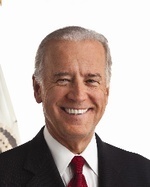 Wikimedia Joe Biden
Wikimedia Joe Biden Who is he? Biden is vice president, and the foremost American advocate for aviator sunglasses and passenger rail.
Is he running? Biden is wrestling with that question. He seems to be grappling with a very real, human set of questions: On the one hand, he's always wanted to be president, and this is his last chance to run. On the other, he is concerned about putting his family through the trouble of a run so soon after the death of his son Beau, and he’d face very difficult odds. A top aide has been contacting Democratic donors, asking them to at least keep an open mind until Biden makes a final choice.
Who wants him to run? The original driving force for the run seems to have been Beau Biden, along with his brother Hunter. Within the Biden camp, former Chief of Staff Steve Ricchetti is said to be the central force. Outside, the group Draft Biden (slogan: “I’m Ridin’ With Biden”) has gained new momentum, and Democrats rattled by Hillary Clinton campaign’s struggles see him as a potential alternative.
Can he win the nomination? Even with Clinton's recent struggles, it's hard to imagine Biden beating her in a primary. The two candidates would likely share some weaknesses, and at 72, Biden would also be an unusually elderly candidate.
When will he announce? Biden will make a decision by early September, according to the Times.
 Wikimedia
Jim Webb
Wikimedia
Jim Webb
Who is he? Webb is a Vietnam War hero and secretary of the Navy. The author of several books, he served as a senator from Virginia from 2007 to 2013.
Is he running? Yes, as of July 2.
Who wants him to run? Dovish Democrats; socially conservative, economically populist Democrats; the Anybody-But-Hillary camp.
Can he win the nomination? Very doubtful. While Webb was the perfect candidate for Senate from Virginia in 2006, his statement in support of the Confederate flag shows why he probably has little hope in the national Democratic Party.
What else do we know? Read Webb’s longtime friend James Fallows on why he wants Webb in the race.
Does his website have a good 404 page? No.
 Wikimedia
Hillary Clinton
Wikimedia
Hillary Clinton
Who is she? As if we have to tell you, but: She’s a trained attorney; former secretary of State in the Obama administration; former senator from New York; and former first lady.
Is she running? Yes.
Who wants her to run? Most of the Democratic Party.
Can she win the nomination? A better question is whether she can lose it.
What else do we know? The real puzzler, after so many years with Clinton on the national scene, is what we don't know. Here are 10 central questions to ask about the Hillary Clinton campaign.
Does her website have a good 404 page? If you’re tolerant of bad puns and ’90s ’80s outfits, the answer is yes.
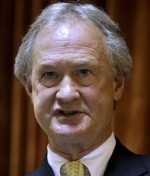 Steven Senne / AP
Lincoln Chafee
Steven Senne / AP
Lincoln Chafee
Who is he? The son of beloved Rhode Island politician John Chafee, Linc took his late father’s seat in the U.S. Senate, serving as a Republican. He was governor, first as an independent and then as a Democrat.
Is he running? Yes—he announced his run at George Mason University on June 3.
Who wants him to run? Beyond metric-system boosters? No one knows! Even in Rhode Island, Chafee doesn’t have much support—he opted not to seek re-election as governor in 2014, in part because his approval rating had reached a dismal 26 percent.
Can he win the nomination? No. Chafee seems to be positioning himself as an economic populist and says Clinton's 2002 vote for the Iraq war should disqualify her (he was the only Republican senator to vote against it). In other words: He's Jim Webb with a less impressive resume, a less compelling bio (he's the son of longtime Senator John Chafee), and less of a political base. He gives himself even odds, though.
Does his website have a good 404 page? No.
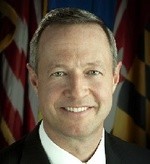 Wikimedia
Martin O'Malley
Wikimedia
Martin O'Malley
Who is he? He’s a former governor of Maryland and mayor of Baltimore.
Is he running? Yes. He announced his campaign on May 30.
Who wants him to run? Not clear. He has some of the leftism of Bernie Sanders or Elizabeth Warren, but without the same grassroots excitement.
Can he win the nomination? Probably not. At the moment, O’Malley seems caught between Sanders, who has grasped the progressive mantle, and Clinton, who dominates the Democratic race overall. It’s hard to see where O'Malley would get an opening unless Clinton’s campaign fell apart. The conventional wisdom since protests over the death of Freddie Gray is that protests in Baltimore undermine the case for his candidacy and make it harder for him to run. Recently, he has feuded with Democratic National Committee Chair Debbie Wasserman Schultz, accusing the party apparatus of being in the tank for Clinton.
What else do we know? Have you heard that he plays in a Celtic rock band? You have? Oh.
Does his website have a good 404 page? No.
 Wikimedia
Bernie Sanders
Wikimedia
Bernie Sanders
Who is he? A self-professed socialist, Sanders represented Vermont in the U.S. House from 1991 to 2007, when he won a seat in the Senate.
Is he running? Yes. He announced April 30.
Who wants him to run? Far-left Democrats; Brooklyn-accent aficionados; progressives who worry that a second Clinton administration would be far too friendly to the wealthy.
Can he win the nomination? When Sanders launched his campaign, this question seemed more or less beside the point. That’s no longer true: Sanders is running neck and neck or even ahead of Clinton in key early primary states. It remains extremely difficult to see him winning the nomination—as Dems from Howard Dean to George McGovern can remind you, primary voters tend to gravitate to “electable” general-election candidates alone. But Sanders has improbably become a huge force in a party he’s technically not a member of. He has made questions about inequality and economics central to the campaign, tugging Hillary Clinton to the left.
Does his website have a good 404 page? Yes, and it is quintessentially Sanders.
 Wikimedia
Elizabeth Warren
Wikimedia
Elizabeth Warren
Who is she? Warren has taken an improbable path from Oklahoma, to Harvard Law School, to progressive heartthrob, to Massachusetts senator.
Is she running? No. Seriously, no.
Who wants her to run? Progressive Democrats; economic populists, disaffected Obamans, disaffected Bushites.
Can she win the nomination? No, because she's not running.
* * *
The Republicans Gage Skidmore
Gage Skidmore Jim Gilmore
Who is he? Right? Gilmore was governor of Virginia from 1998 to 2002. Before that, he chaired the Republican National Committee for a year. In 2008, he ran for Senate in Virginia and lost to Mark Warner by 31 points.
Is he running? Yes. He filed his papers on July 29.
Who wants him to run? Who knows? Gilmore ran for president briefly during the 2008 cycle before switching to the Senate race. There’s not exactly a groundswell for him this time, either. He says he has experience with national security and the economy that other Republican candidates don’t, and if he’s talking about Trump, it’s hard to disagree.
Can he win? Nah.
Does his website have a good 404 page? Nah.
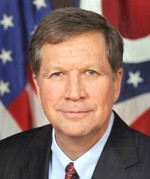 Wikimedia
Wikimedia John Kasich
Who is he? The current Ohio governor ran once before, in 2000, after a stint as Republican budget guru in the House. Between then and his election in 2010, he worked at Lehman Brothers. Molly Ball wrote a definitive profile in April.
Is he running? Yes. His announcement was July 21 at Ohio State University in Columbus.
Who wants him to run? Kasich’s pitch: He’s got better fiscal-conservative bona fides than any other candidate in the race, he’s proven he can win blue-collar voters, and he’s won twice in a crucial swing state.
Can he win the nomination? As Ball noted, Kasich seems in some ways perfectly suited to this race; in other ways, his insistent anti-charisma makes it very hard to imagine him winning, and his attitude is amusingly blasé: “If they like it, great. If they don’t like it, I’ll play more golf.” He could be hurt by his embrace of Medicaid expansion under Obamacare, a move he had to circumvent the Republican-led General Assembly to make.
What else do we know? John Kasich bought a Roots CD and hated it so much he threw it out of his car window. John Kasich hated the Coen brothers’ classic Fargo so much he tried to get his local Blockbuster to quit renting it. George Will laughed at him. John Kasich is the Bill Brasky of philistinism. John Kasich probably hated that skit, too.
Does his website have a good 404 page? Nope.
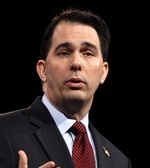 Gage Skidmore
Gage Skidmore Scott Walker
Who is he? Elected governor of Wisconsin in 2010, Walker earned conservative love and liberal hate for his anti-union policies. In 2013, he defeated a recall effort, and he won reelection the following year.
Is he running? Yes. He announced on July 13.
Who wants him to run? Walker's record as governor of Wisconsin excites many Republicans. He's got a solid résumé as a small-government conservative. His social-conservative credentials are also strong, but without the culture-warrior baggage that sometimes brings. And Walker has won three difficult elections in a blue-ish state. He’s said to be a favorite of the Koch brothers and their network.
Can he win the nomination? Very possibly. Despite his strengths, Walker has never run a national campaign and isn't exactly Mr. Personality. Most analysts place him in the top tier of candidates, but his early momentum has faded and Donald Trump has eclipsed him in Iowa. Walker remains an unsteady campaigner, and some of his allies are getting scared and calling for a campaign reboot.
What else do we know? Good news, bad news: Walker has a geographic advantage in his proximity to Iowa, but a potential biological disadvantage from his allergy to dogs.
Does his website have a good 404 page? Aye, matey.
 David Shankbone
David Shankbone Chris Christie
Who is he? What’s it to you, buddy? The combative New Jerseyan is in his second term as governor and previously served as a U.S. attorney.
Is he running? Christie kicked off his campaign June 30 at Livingston High School, his alma mater.
Who wants him to run? Moderate and establishment Republicans who don't like Bush or Romney; big businessmen, led by Home Depot founder Ken Langone.
Can he win the nomination? No. The tide of opinion had turned against Christie even before the "Bridgegate" indictments. Citing his horrific favorability numbers, FiveThirtyEight bluntly puns that “Christie's access lanes to the GOP nomination are closed.”
Does his website have a good 404 page? We would have gone with the GIF, but sure.
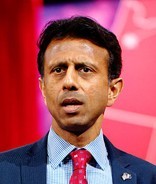 Gage Skidmore
Gage Skidmore Bobby Jindal
Who is he? A Rhodes Scholar, he’s the outgoing governor of Louisiana. He previously served in the U.S. House.
Is he running? Yes. He kicked off his campaign on June 24.
Who wants him to run? It’s hard to say. Jindal has assiduously courted conservative Christians, both with a powerful conversion story (he was raised Hindu but converted to Catholicism in high school) and policies (after other governors reversed course, he charged forward with a religious-freedom law). But he still trails other social conservatives like Ted Cruz and Mike Huckabee.
Can he win the nomination? Probably not. Jindal still lacks traction at the national level, he faces an overcrowded field of social conservatives, and his stewardship of Louisiana has come in for harsh criticism even from staunch fiscal conservatives. It’s hard to see how he gains momentum from here.
What else do we know? In 1994, he wrote an article called “Physical Dimensions of Spiritual Warfare,” in which he described a friend’s apparent exorcism.
Does his website have a good 404 page? Meh. Good joke, but past its expiration date.
 Gage Skidmore
Gage Skidmore Donald Trump
Who is he? The real-estate developer and reality-TV star fired TV personality almost certainly isn’t worth as much as he wants you to think he is.
Is he running? Is he ever! Surprising his rivals, the press, and—one suspects—himself, The Donald is the biggest political story in America.
Who wants him to run? A shocking portion of the Republican primary electorate; Democrats; white supremacists. The rest of the Republican field, along with its intellectual luminaries, however, seem horrified.
Can he win the nomination? At some point he has to collapse, right? This can’t go on forever, right? Right?

What else do we know? He cheats at golf, probably.
 Gage Skidmore
Gage Skidmore Jeb Bush
Who is he? The brother and son of presidents, he served two terms as governor of Florida, from 1999 to 2007.
Is he running? Yes, as of June 15.
Who wants him to run? Establishment Republicans; George W. Bush; major Wall Street donors.
Can he win the nomination? Soon after Bush entered the race, predictions of a Bush-Clinton rematch of 1992 were common. Now, it’s hard to say. Clinton has stumbled, and so has Bush. He now lags well behind Trump, and has hit some fundraising turbulence (ironically caused, it seems, by his early prowess). Trump continues to treat Bush as his main rival, saving his most vicious attacks for Bush. There’s an amorphous expectation that once Trump’s bubble bursts, Bush will regain some altitude. But no one knows exactly how that would work, or how it will happen. Bush remains more moderate than much of the Republican primary electorate (especially on immigration—as the Trump boom has highlighted), his name remains a double-edged sword, and he just doesn’t look all that comfortable or joyous on the trail.
Does his website have a good 404 page? Yes—y en español también.
 Gage Skidmore
Gage Skidmore Rick Perry
Who is he? George W. Bush’s successor as governor of Texas, he entered the 2012 race with high expectations, but sputtered out quickly. He left office in 2014 as the Lone Star State’s longest-serving governor.
Is he running? Yes. He announced on June 4.
Who wants him to run? Bueller?
Can he win the nomination? No. Perry promoters insist that Rick 2016 is a polished, smart campaigner, totally different from the meandering, spacey Perry of 2012. It hasn’t seemed to matter in this field. Perry had to quit paying his staff in South Carolina and New Hampshire, and is down to a single staffer in Iowa. It seems like only a matter of time before he bows out.
Does his website have a good 404 page? That depends. Is this an “oops” joke? If so, yes.
 Wikimedia
Wikimedia Lindsey Graham
Who is he? A senator from South Carolina, he’s John McCain’s closest ally in the small caucus of Republicans who are moderate on many issues but very hawkish on foreign policy.
Is he running? He sure is. Graham kicked off the campaign June 1.
Who wants him to run? John McCain, naturally. Senator Kelly Ayotte, possibly. Joe Lieberman, maybe?
Can he win the nomination? Not really. The South Carolina senator seems to be running in large part to make sure there’s a credible, hawkish voice in the primary. It seems like Graham started his campaign almost as a lark but has started to enjoy the ride, plus he’s shown he’s a great performer on the stump. Molly Ball explores his chances at greater length here.
What else do we know? Graham promises to have a rotating first lady if he wins. We nominate Lana del Ray.
 Michael Vadon
Michael Vadon George Pataki
Who is he? Pataki ousted incumbent Mario Cuomo in 1994 and served three terms as governor of New York.
Is he running? Yes. He announced May 28.
Who wants him to run? It's not clear. Establishment Northeastern Republicans once held significant sway over the party, but those days have long since passed.
Can he win the nomination? No. As my colleague Russell Berman previously noted, Pataki is one of the longest of the long-shot GOP candidates. He has touted his leadership on 9/11, when he served as governor, but so did former New York City Mayor Rudy Giuliani. He was also a successful conservative governor in a deep-blue Northeastern state, but so was former Massachusetts Governor Mitt Romney. He seems to be socially liberal enough to alienate primary voters, but not enough to capture Democrats.
Does his website have a good 404 page? No.
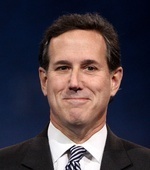 Gage Skidmore
Gage Skidmore Rick Santorum
Who is he? Santorum represented Pennsylvania in the Senate from 1995 until his defeat in 2006. He was the runner-up for the GOP nomination in 2012.
Is he running? Yes, with a formal announcement on May 27.
Who wants him to run? Social conservatives. The former Pennsylvania senator didn't have an obvious constituency in 2012, yet he still went a long way, and Foster Friess, who bankrolled much of Santorum's campaign then, is ready for another round.
Can he win the nomination? It's tough to imagine. As much as Santorum feels he deserves more respect for his 2012 showing, neither voters nor the press seem inclined to give it to him, and he remains trapped in the basement.
Does his website have a good 404 page? No.
 Gage Skidmore
Gage Skidmore Mike Huckabee
Who is he? An ordained preacher, former governor of Arkansas, and Fox News host, he ran a strong campaign in 2008, finishing third, but sat out 2012.
Is he running? Yes. He kicked off the campaign May 5.
Who wants him to run? Social conservatives; evangelical Christians.
Can he win the nomination? Huckabee's struggle is to prove that he's still relevant. Since he last ran in 2008, a new breed of social conservatives has come in, and he’s had trouble keeping up with fresher faces like Ted Cruz and Ben Carson. His brand of moral crusading feels a bit out of date in an era of same-sex marriage—not least when he curiously chose to attack Beyoncé. Huckabee’s answer has been to play as a populist, but that has its own pitfalls: He faces fire from strict conservative groups for tax hikes while he was governor.
Does his website have a good 404 page? It’s pretty good.
 Gage Skidmore
Gage Skidmore Ben Carson
Who is he? A celebrated former head of pediatric neurosurgery at Johns Hopkins, Carson became a conservative folk hero after a broadside against Obamacare at the 2013 National Prayer Breakfast.
Is he running? Yes. He announced May 4.
Who wants him to run? Grassroots conservatives, who have boosted him up near the top of polls, even as Republican insiders cringe. Carson has an incredibly appealing personal story—a voyage from poverty to pathbreaking neurosurgery—and none of the taint of politics.
Can he win the nomination? History weighs heavily against Carson: Not since Dwight Eisenhower has either party nominated anyone without prior elected experience for the presidency. Nonetheless, Carson has quietly shown impressive staying power. He’s running second only to Trump in Iowa polls and in RealClearPolitics’s average of national polls. Still, Carson's politics are eclectic unto near incoherence, and he has a tendency to do things like compare ISIS to the Founding Fathers. He's also suffered from some campaign dysfunction.
Does his website have a good 404 page? No.
 Gage Skidmore
Gage Skidmore Carly Fiorina
Who is she? Fiorina rose through the ranks to become CEO of Hewlett-Packard from 1999 to 2005, before being ousted in an acrimonious struggle. She advised John McCain’s 2008 presidential campaign and unsuccessfully challenged Senator Barbara Boxer of California in 2010.
Is she running? Yes, as of a May 4 announcement.
Who wants her to run? It isn’t clear exactly what Fiorina’s constituency is, but she’s a business-friendly candidates with a talent for a sharp turn of phrase or jab.
Can she win the nomination? The odds remain long, but Fiorina made the most of a spot at the “kid’s table” for the first GOP debate in August. She dominated the opening round and earned a likely promotion to the main stage of the second debate. Fiorina’s strength so far has been going into attack mode, whether that’s against Donald Trump or Hillary Clinton. Still, she faces the same challenges as Carson. Fiorina’s only previously political experience was a failed Senate campaign against Barbara Boxer in 2010.
What else do we know? Fiorina's 2010 Senate race produced two of the most entertaining and wacky political ads ever, "Demon Sheep" and the nearly eight-minute epic commonly known as "The Boxer Blimp."
Does her website have a good 404 page? No.
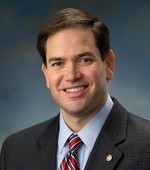 Wikimedia
Wikimedia Marco Rubio
Who is he? A second-generation Cuban-American and former speaker of the Florida House, Rubio was catapulted to national fame in the 2010 Senate election, after he unexpectedly upset Governor Charlie Crist to win the GOP nomination.
Is he running? Yes—he announced on April 13.
Who wants him to run? Rubio enjoys establishment support, and has sought to position himself as the candidate of an interventionist foreign policy.
Could he win the nomination? Charles Krauthammer pegs him as the Republican frontrunner. His best hope seems to be to emerge as a consensus candidate who can appeal to social conservatives and hawks, and he's even sounded some libertarian notes of late. He's well-liked by Republicans, and has surged forward since announcing, but he needs to move up from second choice to first choice for more of them. Rubio seems to scare Democrats more than any other candidate, too. At some point, however, he’ll have to start actually gaining in the polls.
Does his website have a good 404 page? It’s decent.
 Wikimedia
Wikimedia Rand Paul
Who is he? An ophthalmologist and son of libertarian icon Ron Paul, he rode the 2010 Republican wave to the Senate, representing Kentucky.
Is he running? Yes, as of April 7.
Who wants him to run? Ron Paul fans; Tea Partiers; libertarians; civil libertarians; non-interventionist Republicans.
Can he win the nomination? Once tabbed by Time as the most interesting man in politics, he has failed to elicit much interest from voters so far. Paul’s unorthodox politics always made him tough to see in the Republican top tier, but he had impressed many observers during his time in the Senate as a wily campaigner. But his campaign seems stuck in neutral. He hasn’t managed to create the enthusiasm he needs among fans of his father, former Representative Ron Paul, still has no fundraising base, and seems to have largely disappeared from view, leaving in his wake lots of “What happened to Rand Paul?” headlines. A good debate in August would have helped him, but he didn’t have it.
Does his website have a good 404 page? No.
 Wikimedia
Wikimedia Ted Cruz
Who is he? Cruz served as deputy assistant attorney general in the George W. Bush administration and was appointed Texas solicitor general in 2003. In 2012, he ran an insurgent campaign to beat a heavily favored establishment Republican for Senate.
Is he running? Yes. He launched his campaign March 23 at Liberty University in Virginia.
Who wants him to run? Hardcore conservatives; Tea Partiers who worry that Rand Paul is too dovish on foreign policy; social conservatives.
Can he win the nomination? Though his announcement gave Cruz both a monetary and visibility boost, he still carries serious weaknesses. Much of Cruz's appeal to his supporters—his outspoken stances and his willingness to thumb his nose at his own party—also imperil him in a primary or general election, and he's sometimes been is own worst enemy when it comes to strategy. But Cruz is familiar with running and winning as an underdog, and he seems to be positioning himself to absorb Trump supporters once the expected (but never explained) Trump collapse occurs.
Does his website have a good 404 page? No.
 Gage Skidmore
Gage Skidmore Sarah Palin
Who is she? If you have to ask now, you must not have been around in 2008. That’s when John McCain selected the then-unknown Alaska governor as his running mate. After the ticket lost, she resigned her term early and became a television personality.
Is she running? A bizarre speech in January made a compelling case both ways.
Who wants her to run? Palin still has diehard grassroots fans, but there are fewer than ever.
Can she win the nomination? No.
When will she announce? It doesn't matter.
 Gage Skidmore
Gage Skidmore Mitt Romney
Who is he? The Republican nominee in 2012 was also governor of Massachusetts and a successful businessman.
Is he running? Probably not, but who knows! He announced in late January that he would step aside, but now New York claims that the Trump boom has him reconsidering.
Who wanted him to run? Former staffers; prominent Mormons; Hillary Clinton's team. Romney polled well, but it's hard to tell what his base would have been. Republican voters weren't exactly ecstatic about him in 2012, and that was before he ran a listless, unsuccessful campaign. Party leaders and past donors were skeptical at best of a third try.
Could he have won the nomination? He proved the answer was yes, but it didn't seem likely to happen again.
 Gage Skidmore John Bolton
Gage Skidmore John Bolton Who is he? A strident critic of the UN and leading hawk, he was George W. Bush’s ambassador to the UN for 17 months.
Is he running? Nope. After announcing his announcement, in the style of the big-time candidates, he posted on Facebook that he wasn’t running.
Who wanted him to run? Even among super-hawks, he didn’t seem to be a popular pick, likely because he had no political experience.
Could he have won the nomination? They say anything is possible in politics, but this would test the rule. A likelier outcome could be a plum foreign-policy role in a hawkish GOP presidency.









Hand of God: A Dark, Violent, Vigilante Drama About Religion

Amazon’s new drama, Hand of God, opens on a nude Ron Perlman cavorting in a fountain and speaking in tongues. Perlman plays Pernell Harris, a judge who’s recently undergone an off-screen conversion to fundamentalist Christianity, and who’s now on a quest to exact justice against the mysterious villains who (unrelatedly) assaulted his daughter-in-law and left his son in a coma. His new faith has also granted him elaborate visions, giving the show some bravura visual sequences to back up the violence that follows.
To hear all this described, it might sound like the show promises a simple premise and a wealth of action; unfortunately, it delivers neither.
Related Story
But while Hand of God sounds frankly bonkers on paper, it suffers from the same self-seriousness and density of plot as this summer’s faulty season of True Detective, spoiling the work of a fine ensemble. In this early foray into TV drama, Amazon is making the same mistake a lot of other fledgling networks have made, picking a project with the kind of lurid, dark material you could never see on network TV. But Hand of God is badly overcooked, and its exploration of fundamentalist Christianity seems mostly a surface-level justification for the vigilante violence that ensues.
Perlman’s Harris is a hard-driving criminal judge who becomes a congregant in a radical church fronted by a handsome huckster, Paul Curtis (Julian Morris), after the brutal rape of his daughter-in-law (Alona Tal) leads his son PJ to attempt suicide, putting him in a coma. Harris is married to the no-nonsense Crystal (Dana Delany), is mixed up in a major land deal organized by the city’s mayor (Andre Royo), and believes his aforementioned visions will lead him toward finding his daughter-in-law’s attackers.
That quest is as close as Hand of God gets to a premise, focusing on Harris’s efforts to decipher his visions, with the help of a psychotic ex-con (Garret Dillahunt) whom he helped free from jail. As with so many pseudo-religious storylines on TV, it seems that Harris’s visions are somehow leading him on the right path, although he quickly begins to unravel a preposterous conspiracy that suggests the attackers in his son’s house that fateful night were part of a much larger, more evil organization.
Land deals, offscreen conspiracies, and a mystery that revolves around the rape of a woman? In a number of ways, Hand of God has notes of True Detective season two, but to its credit, it’s somewhat more comprehensible than the HBO show, and at least a little funnier. Perlman is an incredibly charming actor no matter how hokey his material, and he always rises to the occasion of a starring role, holding focus as he did in Sons of Anarchy and the Hellboy film series. Delany is similarly magnetic, but has much less purpose in the main plot and so often feels like superfluous baggage. Dillahunt is the kind of character actor who’s impossible to waste, as evidenced by his eclectic work over the years in shows like Deadwood, Raising Hope, and The Sarah Connor Chronicles, and he’s indisputably compelling as a stabby religious maniac bent on doing God’s (and Harris’s) will.
Land deals, offscreen conspiracies, and a mystery regarding a woman? Paging True Detective season two.Still, the show is almost relentlessly grim. There’s a much more entertaining but less intensely violent show buried in Hand of God somewhere. The idea of Ron Perlman as a grumpy old judge and Dana Delany as his steely wife reads like something NBC would have greenlit in 1992, and a handful of brief scenes of Perlman behind the bench have some old-school crackle to them. But Amazon seems to be embracing the intense serialization of Netflix and other streaming services, unfolding Hand of God’s first season as one novel-sized story that inches infuriatingly towards its conclusion.
There’s some satisfaction in carrying Hand of God to the end of its 10 episodes, of course, since the ultimate conspiracy is revealed and the legitimacy of Harris’s religious conviction is, to some extent, answered. But the show’s writer, Ben Watkins, doesn’t place his conversion, nor the violence enacted, under nearly enough scrutiny. Hand of God mistakes grim violence for compelling drama, and in doing so fails to delve into much more fascinating material that exists on the margins. Neither can it take advantage of its talented cast to have them do much more than rant and growl at the bleak world they’ve found themselves in. That alone isn’t enough to justify 10 depressing hours of television.









Atlantic Monthly Contributors's Blog
- Atlantic Monthly Contributors's profile
- 1 follower



